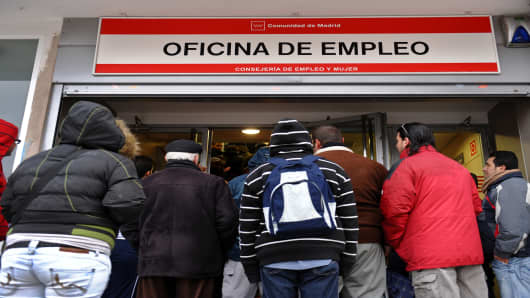Despite European officials' push for labor market reforms in the struggling euro zone, the process of matching jobless workers to vacancies is deteriorating, according to Goldman Sachs.
"We find the process of matching unemployed workers with vacancies has deteriorated in the euro area since the onset of the crisis... This is driven by the cyclical divergence across countries, combined with segmented labor markets," Goldman Sachs analysts said in a European research note published on Friday.
The analysts noted that job openings were predominately concentrated in Germany and France, while the unemployed were mostly in Spain and Italy. "Limited labor mobility prevents these from being matched," they said.
(View Slideshow: Countries With the Highest Unemployment Rates)
The financial crisis has had a significant effect on European labor markets and euro zone unemployment is at a record high of 12.1 percent. However, this headline figure hides significant divergence across countries, with the unemployment rate at 26.7 percent in Spain, but only 5.4 percent in Germany, its lowest level in over 20 years.
"The demand for labor reallocation across the euro area has risen… However, labor markets remain primarily national: while migration from the periphery to Germany has increased, it remains too low to absorb the required adjustment," Goldman Sachs said.
(Read More: Germany Sees Immigration Surge From Crisis-Hit Europe)
Goldman Sachs' research suggested the European Monetary Union (EMU) had a positive impact on the functioning of European labor markets at its instigation, including for the U.K., which is not a member. However, the effect seemed to have reversed since the onset of the financial crisis.
For instance, the analysts noted that 4.3 percent of euro zone companies are currently reporting labor shortages, similar to the level seen in the third quarter of 2006. However, unemployment is now almost 4 percent higher than in 2006.
A decrease in the efficiency of the job-matching process may be expected in a deep recession, because, for example, the long-term unemployed may become less qualified for the jobs available.
However, Goldman said historical data suggested the decline was mostly due to structural factors, rather than the recession. "Developments since fourth quarter 2011 seem to be more structural in nature, as the counter-clockwise cyclical pattern seen until then has not continued."
(View More: Europe's Unemployment Woes to Worsen: Pro)
—By CNBC's Katy Barnato



